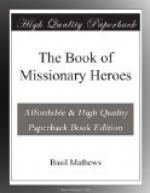The two men strode on. The forest path opened out to a broad clearing. They were in an African village. But no voice was heard and no step broke the horrible silence. It was a village of death. The sun blazed on the charred heaps which now marked the sites of happy African homes; the gardens were desolate and utterly destroyed. The village was wiped out. Those who had submitted were far away, trudging through the forest, under the lash of the slaver; those who had been too old to walk or too brave to be taken without fight were slain.
The heart of Livingstone burned with one great resolve—he would track this foul thing into the very heart of Africa and then blazon its horrors to the whole world.
The two men trudged back to the river bank again. Now, with their brown companions, they took the shallow boat that they had brought on the deck of the Asthmatic, and headed still farther up the Shire river from the Zambesi toward the unknown Highlands of Central Africa.
Facing Spears and Arrows
Only the sing-song chant of the Africans as they swung their paddles, and the frightened shriek of a glittering parrot, broke the stillness as the boat pushed northward against the river current.
The paddles flashed again, and as the boat came round a curve in the river they were faced by a sight that made every man sit, paddle in hand, motionless with horror. The bank facing them in the next curve of the river was black with men. The ranks of savages bristled with spears and arrows. A chief yelled to them to turn back. Then a cloud of arrows flew over the boat.
“Go on,” said Livingstone quietly to the Africans. Their paddles took the water and the boat leapt toward the savage semi-circle on the bank. The water was shallower now. Before any one realised what was happening Livingstone had swung over the edge of the boat and, up to his waist in water, was wading ashore with his arms above his head.
“It is peace!” he called out, and waded on toward the barbs of a hundred arrows and spears. The men in the boat sat breathless, waiting to see their leader fall with a score of spears through his body. But the savages on the bank were transfixed with amazement at Livingstone’s sheer audacity. Awed by something god-like in this unflinching and unarmed courage, no finger let fly a single arrow.
“You think,” he called to the chief, “that I am a slave-raider.” For Livingstone knew that he had never in all his wanderings been attacked by Africans save where they had first been infuriated by the cruel raiders.
The chief scowled.
“See,” cried Livingstone, baring his arm to show his white skin as he again and again had done when threatened by Africans, “is this the colour of the men who come to make slaves and to kill?”
The savages gazed with astonishment. They had never before seen so white a skin.
“No,” Livingstone went on, “this is the skin of the tribe that has heart toward the African.”




